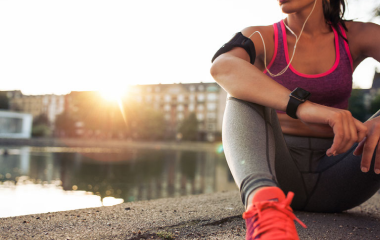In a best-of-seven postseason playoff, the Washington Nationals rallied to become World Series champions last month. Their secret weapon? Sleep.
Since 2017, Dr. Meeta Singh, a sleep doctor, has worked with the Nationals to improve their sleep routines. With Dr. Singh’s help, the Nationals have focused on creating better sleep schedules and rethinking travel arrangements to prioritize a good night’s sleep.
The Nationals’ opponent, the Houston Astros, also had a sleep proponent in their locker room. Astros pitcher Justin Verlander, dubbed the “sleep guru,” advocates for the legal, performance-enhancing effects of a good night’s sleep as well. While data shows the average American sleeps just 6.8 hours per night, Verlander aims for 10 hours or more — nearly 50% more than you may get tonight.
Recognizing the value of sleep
It’s not just baseball players who recognize that sleep is key to achieving peak performance. Representing a wide variety of sports, athletes such as Usain Bolt, Maria Sharapova, Michael Phelps, Steph Curry and Lindsey Vonn — to name a few — have opened up about their sleep habits.
From extra hours of shut-eye to uninterrupted nap time, these elite athletes recognize that their bodies need to be in top shape to perform. Demanding game and travel schedules leave little time for recovery, something their bodies desperately need after pushing to the limit.
Athletes are prone to sleep deprivation, which affects both performance and mood. Poor sleep quality is linked to confusion, depression and fatigue in athletes. Sleep-deprived athletes are also at a higher risk to have a traumatic sports injury or illness. Studies show that athletes experience slower reaction time, less strength, decreased decision-making skills and less stamina when they are sleep deprived.
Sleep deprivation refers to going an extended time without sleep. While the term “sleep deprivation” is often tossed around, it’s more common to have insufficient sleep. Insufficient sleep refers to getting less than the recommended amount of sleep or having poor sleep because of a sleep disorder. The Centers for Disease Control (CDC) estimates that 35% of Americans are getting insufficient sleep.
But just because you’re getting less than Verlander’s 10 hours of shut-eye doesn’t mean that you’re getting insufficient sleep. The American Academy of Sleep Medicine recommends that adults should sleep 7 or more hours per night regularly to promote optimal health.
Sleep quality as important as quantity
It’s not just the duration of sleep that matters, it’s the quality as well. Even if you aren’t an elite athlete — and let’s face it, most of us are not — you can still benefit from taking on healthy sleep habits to improve your performance.
In addition to good sleep hygiene, studies have found that napping and sleep extension, which refers to getting extra sleep over a few nights or weeks, can boost athletic performance and recovery.
So, if you’re training for a marathon or just hitting the gym after work, adjust your workout schedule to allow for enough sleep so you can wake up feeling refreshed and alert. Research shows that athletic performance is best in the evening when your core body temperature is at its peak. Beware of training late at night, though. It has been shown to interfere with your circadian rhythm and make it harder to fall asleep.
You may not be an Olympic gold medalist, Super Bowl champion or French Open winner, but these lessons from top-tier athletes can help you achieve better performance and improve your health.
Authored by:
Kate Robards





